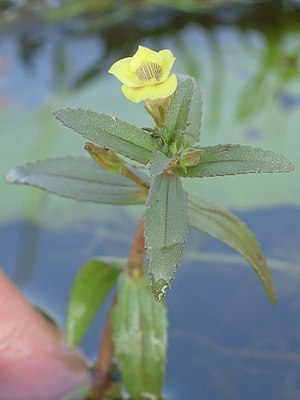Note: This is a project under development. The articles on this wiki are just being initiated and broadly incomplete. You can Help creating new pages.
Difference between revisions of "Limnophila indica"
| (2 intermediate revisions by 2 users not shown) | |||
| Line 11: | Line 11: | ||
==Common names== | ==Common names== | ||
| − | {{Common names|sa=Amragandhah|en=Indian marshweed|gu=|hi=Gulabi|kn=Amaragandhi|ks=|ml=Tsjeria manganari |mr=|pa=|ta=|te=Ambujam}} | + | {{Common names|sa=Amragandhah|en=Ambulia, Indian marshweed|gu=Tareti |hi=Gulabi|kn= ಆಮರಗಂಧಿ Amaragandhi, ಮಾಂಗನ್ನಾರಿ Mangannari|ks=|ml=Tsjeria manganari|mr=Ambuli|pa=|ta=|te=Ambujam}} |
| + | <ref name="Common names"/> | ||
==Properties== | ==Properties== | ||
| Line 70: | Line 71: | ||
<ref name="chemical composition">[Chemistry]</ref> | <ref name="chemical composition">[Chemistry]</ref> | ||
| − | + | <ref name="Common names">[https://sites.google.com/site/indiannamesofplants/via-species/l/limnophila-indica Common names]</ref> | |
<ref name="Leaf">[Morphology]</ref> | <ref name="Leaf">[Morphology]</ref> | ||
Latest revision as of 14:08, 17 June 2020
Limnophila indica is an amphibious, perennial plant. It can vary from a slender, gregarious plant about 5cm tall when growing on the mud of river banks and rice fields, to a long, much-branched, submerged herb with up to 15cm of stem emerging from the water, when growing in the deeper water of pools.
Contents
- 1 Uses
- 2 Parts Used
- 3 Chemical Composition
- 4 Common names
- 5 Properties
- 6 Habit
- 7 Identification
- 8 List of Ayurvedic medicine in which the herb is used
- 9 Where to get the saplings
- 10 Mode of Propagation
- 11 How to plant/cultivate
- 12 Commonly seen growing in areas
- 13 Photo Gallery
- 14 References
- 15 External Links
Uses
Dysentery, Diarrhoea, Dyspepsia, Dysentery, Strong fevers.[1]
Parts Used
[[:Category:Herbs with used in medicine|]], stem, leaves, Root.
Chemical Composition
Common names
| Language | Common name |
|---|---|
| Kannada | ಆಮರಗಂಧಿ Amaragandhi, ಮಾಂಗನ್ನಾರಿ Mangannari |
| Hindi | Gulabi |
| Malayalam | Tsjeria manganari |
| Tamil | |
| Telugu | Ambujam |
| Marathi | Ambuli |
| Gujarathi | Tareti |
| Punjabi | |
| Kashmiri | |
| Sanskrit | Amragandhah |
| English | Ambulia, Indian marshweed |
Properties
Reference: Dravya - Substance, Rasa - Taste, Guna - Qualities, Veerya - Potency, Vipaka - Post-digesion effect, Karma - Pharmacological activity, Prabhava - Therepeutics.
Dravya
Rasa
Guna
Veerya
Vipaka
Karma
Prabhava
Habit
Identification
Leaf
| Kind | Shape | Feature |
|---|---|---|
Flower
| Type | Size | Color and composition | Stamen | More information |
|---|---|---|---|---|
| {{{5}}} |
Fruit
| Type | Size | Mass | Appearance | Seeds | More information |
|---|---|---|---|---|---|
Other features
List of Ayurvedic medicine in which the herb is used
Where to get the saplings
Mode of Propagation
How to plant/cultivate
The plant is listed as a noxious weed in N. America.[5]
Commonly seen growing in areas
Photo Gallery
References
- ↑ Indian Medicinal Plants by C.P.Khare
- ↑ [Chemistry]
- ↑ Common names
- ↑ [Morphology]
- ↑ Cultivation
External Links
- Ayurvedic Herbs known to be helpful to treat Dysentery
- Ayurvedic Herbs known to be helpful to treat Diarrhoea
- Ayurvedic Herbs known to be helpful to treat Dyspepsia
- Ayurvedic Herbs known to be helpful to treat Strong fevers
- Herbs with used in medicine
- Herbs with stem used in medicine
- Herbs with leaves used in medicine
- Herbs with Root used in medicine
- Herbs with common name in Kannada
- Herbs with common name in Hindi
- Herbs with common name in Malayalam
- Herbs with common name in Telugu
- Herbs with common name in Marathi
- Herbs with common name in Gujarathi
- Herbs with common name in Sanskrit
- Herbs with common name in English
- Habit - Perennial
- Index of Plants which can be propagated by Seeds
- Index of Plants which can be propagated by Cuttings
- Herbs that are commonly seen in the region of Along riversides
- Herbs that are commonly seen in the region of Marshes
- Herbs
- Pages without herbs images






